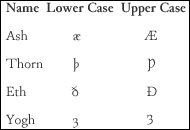
Medieval and Other Fonts
Fonts for Old and Middle English
In Microsoft Windows, the most common medieval characters are standard. On the Macintosh, you must download a special font. In either case, the special Junicode font contains many special characters useful for writing about medieval texts.
The most common special characters needed for Old and Middle English are listed in the table below:

If you are using Microsoft Windows, ash, thorn, and eth can all be added choosing "Insert" and "Symbol" from the menu bar. You may also type these characters directly by holding down the "Alt" key and typing in the appropriate ASCII code, as shown below:
Name |
Lower Case |
Upper Case |
Ash |
Alt+0230 |
Alt+0198 |
Thorn |
Alt+0254 |
Alt+0222 |
Eth |
Alt+0240 |
Alt+0208 |
To get a yogh, you must first download and install the "TrueType for Windows/Linux" Junicode font, and then place the yogh in your document by choosing "Insert" and "Symbol" from the menu bar. An acceptable alternative is to type the numeral "3" and subscript it for a lower case yogh.
If you are using a Macintosh, it is very difficult to get medieval characters. If you are using OS X, I recommend downloading and installing the "TrueType for OS X" Junicode font. For earlier system versions, your should download and install the "Macintosh TrueType" Old English Font Pack, which contains a font called "JuniusModern". This font has all the necessary characters. To insert special characters in your document, select Key Caps from the Apple menu (OS 7,8 or 9) or from the Utilities folder (OS X), and follow the instructions. Other methods of inserting special characters such as the popular PopChar (which costs money) are also recommended.
If you cannot get special characters, it is acceptable to type similar English letters and then modify them by hand on the printout.
The International Phonetic Alphabet
The Junicode font contains the most common International Phonetic Alphabet (IPA) characters for use in English. Another common downloadable IPA font is SIL family of fonts, especially "SILDoulos".
Last Update: 3 October, 2004